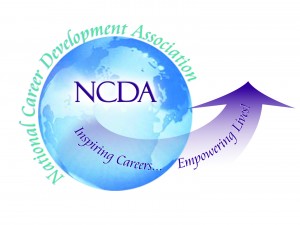 The National Career Development Association (NCDA) is the home for approximately 3,800 practitioners, scholars, and students devoted to promoting the career development of all people over the life span. As the third largest division of the American Counseling Association, NCDA provides service to the public and professionals involved with or interested in career development. NCDA has a long history of service to the counseling profession.
The National Career Development Association (NCDA) is the home for approximately 3,800 practitioners, scholars, and students devoted to promoting the career development of all people over the life span. As the third largest division of the American Counseling Association, NCDA provides service to the public and professionals involved with or interested in career development. NCDA has a long history of service to the counseling profession.
In 1913, the National Vocational Guidance Association (NVGA) was founded. The inception of NVGA stemmed from the changing economic and educational milieu and a social demand for the guidance of youth. In 1951, the association accepted divisional status in the American Personnel and Guidance Association, now called the American Counseling Association. In 1985, NVGA became the National Career Development Association (NCDA). On a global scale, NCDA promotes sharing of workforce policy and practices and welcomed its first international affiliate in 2002, the Japan Career Development Association. NCDA provides a voice for members who deliver career services to diverse groups in a variety of settings.
NCDA has been instrumental in disseminating knowledge on career theory, research, and practice. In 1921, NCDA published its first periodical, the National Vocational Guidance Association Bulletin. In 1952, after a few title changes, the journal was renamed the Vocational Guidance Quarterly and later became the Career Development Quarterly (CDQ) in 1986, which remains as the official journal of NCDA today. The purpose of the CDQ is to foster career development through the design and use of career interventions and publish articles on career counseling, individual and organizational career development, work and leisure, career education, career coaching, and career management. In addition to the CDQ, the counseling profession has made great progress in defining the specialty of career counseling.
NCDA speaks for professionalism and is the recognized leader in developing standards for career counseling and development. NCDA sets ethical standards for the field, including guidelines for the provision of career services on the Internet, and provides competency and performance indicators. NCDA works with licensing and credentialing bodies to support the recognition of career counselors and career development facilitators (CDF). The CDF credential was developed to provide standards, training specifications, and credentialing for individuals who are currently providing career assistance but are not professional counselors. In cooperation with the Association for Counselor Education and Supervision (ACES), the ACES/NCDA commission on Preparing Counselors for the New Millennium was developed to stress the continued importance for career training in the counseling curriculum. Committed toward higher standards, NCDA has recognized members for their exemplary service to the profession.
Recognition for achievement and service has been a hallmark of the NCDA. Recognition awards and monetary grants are conferred annually to members, including graduate students in counseling for their outstanding practical or theoretical contributions to the career field. Awards are presented at the annual conference, which is a global gathering that attracts over 1,000 career development professionals across many career service areas. To recognize career professionals who exhibit professional distinction, NCDA recently created three special membership categories: Fellow, Master Career Counselor (MCC), and Master Career Development Professional (MCDP). Through these efforts and many others, the NCDA continues to foster a sense of community among its members and will strive to be a leader in the field of career development for years to come.
See also:
References:
- National Career Development Association. 1997. Career Counseling Competencies. Tulsa, OK. Author.
- National Career Development Association. 2000. Preparing Counselors for Career Development in the New Millennium: ACES/NCDA Position Paper. Tulsa, OK. Author.
- National Career Development Association. 2003. Ethical Standards. Tulsa, OK. Author.
- Swanson, J. L. and O’ Brien, K. M. 2002. “Training Career Counselors: Meeting the Challenges of Clients in the 21st Century.” Pp. 354-369 in Adult Career Development: Concepts, Issues, and Practices, 3d ed., edited by S. Niles. Tulsa, OK: National Career Development Association.
